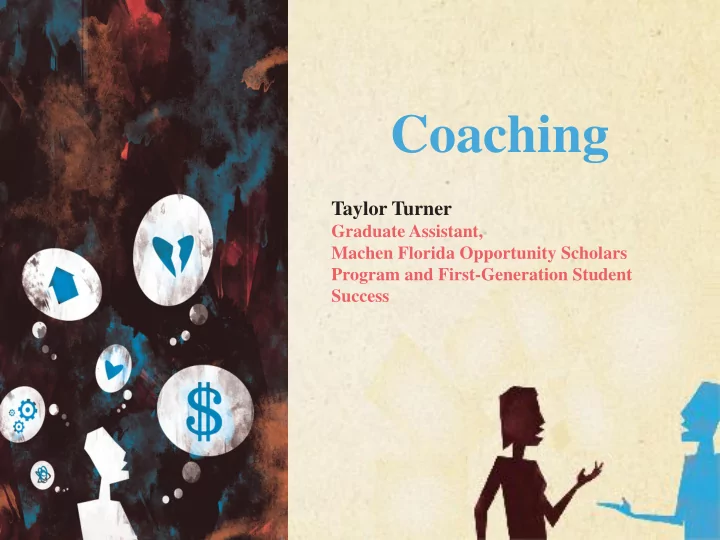

Coaching Coaching Taylor Turner Graduate Assistant, Machen Florida Opportunity Scholars Program and First-Generation Student Success
Coaching Coaching Table of Contents Overview of Coaching Using an Intake process Holding them and yourself accountable
Coaching Coaching versus Mentoring MENTOR: a trusted counselor or guide COACH: one who instructs or trains Merriam-Webster Dictionary Overview of Coaching
Coaching Coaching versus Mentoring Specific Agenda Life Coaches • Increase knowledge of leadership skills • Give guidance on career path • Guidance on post-college plans • Guidance to achieve goals Overview of Coaching
Coaching Coaching versus Mentoring Performance • going beyond what is expected • setting one’s own highest standards, invariably standards that surpass what others demand or expect • expression of one’s potential • taking total responsibility or ownership. Whitmore, 2009 Overview of Coaching
Coaching Coaching versus Mentoring Questions n A Action or anticipatory reflective questions used to choose best action or intervention, to organize meetings or actions to change the situation C Challenging and critical inquiry to test the individual’s assumptions E Evaluative questions to make judgments about worth, value, and wholeness of a situation F Seeks further detail and expansion on information already provided H Hypothetical situations P Probing , which is useful where information may have been omitted Q Qualifying questions to help establish what is in and what is out R Reflexive and introspective questions that ask about personal emotions and process S High order or supposition to predict and speculate about what might happen T Request to complete a specific task Sofo, Yeo, & Villafañe, 2010 Overview of Coaching
Coaching Coaching Framework Self-assessment/reflection Coachee Planning Coach Goal Setting Coachee/Coach Individual Support Coach Robinson & Gahagan, 2010 Overview of Coaching
Coaching The first meeting • When? Where? • How will you contact? “Designing the alliance” • How much challenge • “Rules” & Consequences • Personal goals Getting to know • Knowledge your “ coachee ” • What areas will you work on? Whitworth, Kimsey-House and Sandahl, 2007 Using an Intake process
Coaching After the first meeting – Start Coaching Planning Knowing resources Assignments: (1) putting people into challenging situations (2) having them work with people other than those they’re used to (3) enduring a hardship (4) taking courses (5) creating skill-building experiences Some assignments are do others are experiment Oberstein, 2009; Lombardo, M. & Eichinger, 1989 Beginning coaching
Coaching Establishing performance goals Goals Reality Options Will Whitmore, J. S. Coaching for performance : GROWing human potential and purpose : The principles and practice of coaching and leadership, (4th ed.). Boston: Nicholas Brealey Publishing, Norwood, Mass. The GROW Method
Coaching Establishing performance goals • What would you like to see at Short- the end of this meeting? • What would you like to discuss? Term • What will be of value to you? Goals Long- • The ideal situation • However long it takes for Term success Whitmore, 2009 The GROW Method
Coaching Establishing performance goals • What is happening? Current • What is your perception of the situation? Reality • Who is involved? • What stage are you in? Reality Effects of • What impact does the situation have on you and others? current reality Whitmore, 2009 The GROW Method
Coaching Establishing performance goals • What alternatives are there? • What could you do to change the Options situation? • What are the benefits and pitfalls of each of these? Options • Who might be able to help? • What avenues have not been Opportunities tried? • What resources are you aware of that could be useful? Whitmore, 2009 The GROW Method
Coaching Establishing performance goals Action • What will you do? • When are you going to do it? Plan • Will this action meet your goal? (Will) • What support will you need? Will • What potential obstacles might you meet along the way? Way • How will these actions ensure that you overcome the forward obstacles? Whitmore, 2009 The GROW Method
Coaching Establishing performance goals Whitmore, J. S. Coaching for performance : GROWing human potential and purpose : The principles and practice of coaching and leadership, (4th ed.). Boston: Nicholas Brealey Publishing, Norwood, Mass. The GROW Method
Coaching Seven Reasons Coaching Relationships Fail Bobbi Kahler, President of Kahler Leadership Group 1. Feedback is mistaken for coaching. 2. Advice giving is mistaken for coaching. 3. Lack of relationship. 4. A one-size-fits all approach. 5. Lack of training. 6. Purpose of coaching is missed. 7. Student is not open to coaching. http://www.cunaopsscouncil.org/news/4532.html
Coaching Questions Thank You
Coaching References The GROW model: Coaching others to improve performance. Mind tools: Essential skills for an excellent career. Retrieved Feb. 26, 2011 from http://www.mindtools.com/pages/article/newLDR_89.htm Whitmore, J. S. Coaching for performance : GROWing human potential and purpose : The principles and practice of coaching and leadership, (4th ed.). Boston: Nicholas Brealey Publishing, Norwood, Mass. Whitworth, L., Kimsey-House K., Kimsey-House, H., & Sandahl, P. (2007). Co-active coaching: new skills for coaching people toward success in work and life . 2nd ed. Mountain View, CA: Davies-Black Pub. Oberstein, S. (2009). Step 7 - Partner to Enhance Growth Between Sessions". 10 Steps to Successful Coaching. ASTD. Books24x7. <http://common.books24x7.com.lp.hscl.ufl.edu/toc.aspx?bookid=31150> (accessed January 29, 2012) Lombardo, M. M. & Eichinger, R. W.. (1989). Eighty-eight assignments for development in place. [Books24x7 version] Available from http://common.books24x7.com.lp.hscl.ufl.edu/toc.aspx?bookid=2336. Sofo F., Yeo R.K., Villafane J. Optimizing the learning in action learning: Reflective questions, levels of learning, and coaching (2010) Advances in Developing Human Resources, 12 (2), pp. 205-224.
Recommend
More recommend